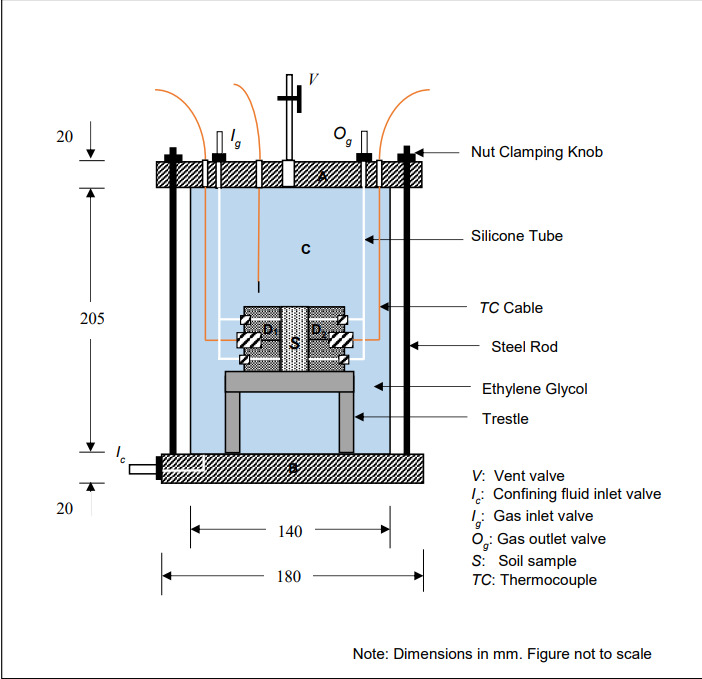The present invention facilitates the unique advantage of performing gas permeability tests at varied temperature and confining pressure conditions, while avoiding interfacial gas flow issues typically seen in conventional rigid-wall permeameters. The novel device and methodology incorporate high-precision thermocouples, ensuring continuous temperature data logging for both the soil sample and the confining fluid. This enhances the accuracy and reliability of measuring gas conductivity in soils under controlled laboratory conditions that simulate real-world environmental scenarios.
The devices and methodologies in practice for the laboratory scale measurement of Gas Conductivity in soil, offers limitations that includes, high costs, and limited control over temperature and pressure conditions during the experimentation. Hence, there arise an explicit need for a laboratory device that can reliably measure gas conductivity under varied and controlled environmental conditions.
- Controlled Environmental Simulation: GasCon-TP is uniquely designed to measure gas conductivity of soils under varied temperature (from 22°C to -14°C) and confining pressure conditions, simulating real-world geoenvironmental scenarios in a lab setting.
- Integrated High-Precision Thermocouples: This device includes multiple DS18B20 thermocouples for continuous and accurate temperature monitoring of both the soil sample and the surrounding fluid, ensuring reliable thermal data during testing.
- Leak-Proof and Uniform Flow Design: It uses stainless steel caps (D1 and D2) with concentric rings and multiple O-rings ensure uniform gas distribution across the soil sample and eliminate interfacial leakage, which is common in traditional permeameters.
- Robust Yet Compact Construction: This device is built using 6 mm thick Perspex for the cell and aluminum plates at top and base. The device can withstand up to 2 MPa stress, while maintaining a compact and modular design that’s easy to assemble and operate.
- Cost-Effective and Versatile: GasCon-TP is simple to fabricate and economically viable, making it an ideal tool for applications in landfills, nuclear waste containment, gas hydrate studies, and carbon sequestration research.
The prototype consists of a set of top and base plates made from aluminum, each measuring 180 mm × 180 mm × 20 mm, and precisely machined to include dedicated holes for thermocouples, gas inlet and outlet valves, and a venting port. These plates are designed to tightly secure the cylindrical cell and ensure a leak-proof setup. The central component of the device is a cylindrical cell made from Perspex, with a height of 205 mm and an internal diameter of 140 mm. This cell is engineered to withstand high internal pressures, making it suitable for controlled gas flow experiments.
Stainless steel caps are placed at both ends of the soil sample, incorporating internal grooves and ports that facilitate uniform gas flow and allow for the insertion of thermocouples for accurate temperature monitoring. The soil specimen itself is enclosed within a flexible rubber membrane, which is sealed in a manner similar to triaxial testing configurations, ensuring proper confinement during testing. Thermocouples of model DS18B20 are embedded at strategic points to monitor temperatures of both the soil sample and the surrounding fluid medium. Gas flow into and out of the system is regulated through precision inlet and outlet valves, which are connected to external gas sources and a pressure-volume measurement device, enabling controlled and measurable gas permeability testing under varied temperature and pressure conditions.
GasCon-TP has been fully developed, fabricated, and validated through experiments on various soil samples. Repeatable results under controlled lab conditions have confirmed its reliability and performance.
9
The GasCon-TP device contributes to public and environmental safety by enabling accurate testing of gas flow through soils, crucial for designing safer landfills, waste containment systems, and carbon storage sites. It supports climate action by aiding research in CO₂ sequestration and methane hydrate extraction, helping develop cleaner energy solutions. In cold regions, it helps understand gas behavior during freeze–thaw cycles, improving infrastructure resilience. Its affordable, lab-scale design makes advanced testing accessible to researchers and institutions, promoting informed decisions in environmental management and sustainable engineering.
- Landfill and Waste Management: Helps in design liners to control contaminant and gas migration, ensuring safer waste containment
- Carbon Capture and Storage (CCS): Assesses soil suitability for secure and long- term CO₂ storage in subsurface environments
- Nuclear Waste Containment: Evaluates barrier materials for safe containment of radioactive gases and contaminants
- Geotechnical and Cold Region Research: Simulates soil-gas behavior under varied conditions, including freeze-thaw cycles
Geography of IP
Type of IP
201721031020
520086

